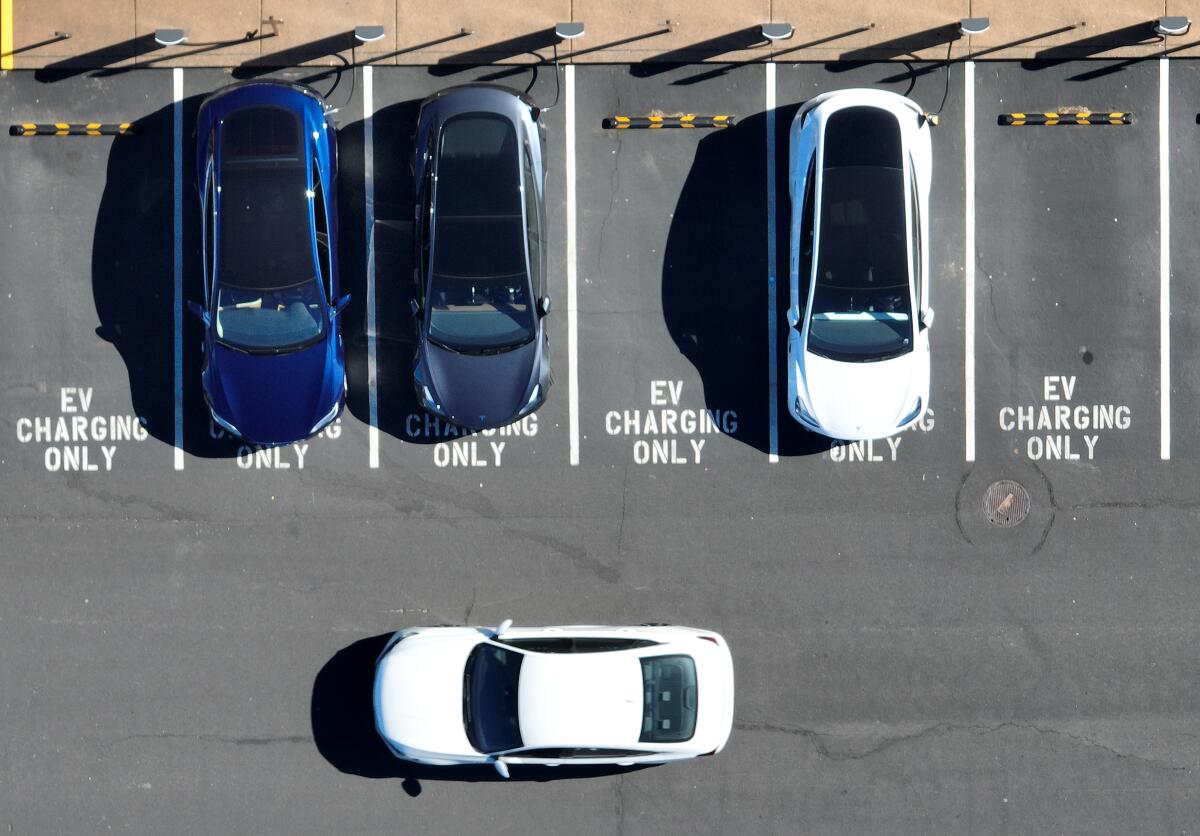California receives $150 million for thousands of EV charging ports

- Share via
U.S. officials awarded California nearly $150 million for the construction of more than 9,200 electric vehicle charging ports in an attempt to make zero-emission cars attractive to a wider range of drivers.
The funding from the Department of Transportation’s is part of a $521-million infrastructure package awarded to 29 states, eight federally recognized tribes and the District of Columbia.
The federal government’s goal is to reduce greenhouse gas emissions and pollution by investing in electric vehicle infrastructure that has promised to significantly improve the climate. A lack of reliable charging stations has proved to be one setback that has challenged the industry.
“One of the reasons that we’re seeing in the market research why EV sales are not taking off the way that many of the manufacturers had thought is because people have range anxiety,” Federal Highway Administrator Shailen Bhatt said. “If you live in multifamily housing and you don’t have a driveway, there should be a charger close by so that you could charge your vehicle and you’re not stranded.”
Bhatt announced the news Tuesday at an event about sustainable concrete inside the Dorothy Chandler Pavilion in downtown Los Angeles.
The bulk of state funds will go to the California Department of Transportation, which will receive $102 million for charging and hydrogen fueling stations for zero-emission vehicles, including trucks, along freight corridors in California, Oregon and Washington.
The funds also include $15 million for Los Angeles County, the city of Los Angeles and the Los Angeles County Metropolitan Transportation Authority to construct more than 1,250 accessible EV charging stations with a focus on benefiting undeserved communities; $15.1 million for the Fort Independence Indian Reservation to install an EV charging hub along the U.S. Route 395 corridor, between Southern California and Mammoth; $14 million for Bay Area Rapid Transit to construct charging ports at BART-managed parking facilities; and $3.2 million for the Shingle Springs Band of Miwok Indians to install 70 EV charging stations at the reservation and along U.S. Route 50 between Sacramento and South Lake Tahoe.
“The Biden-Harris Administration has taken action to ensure that America leads the EV revolution, and the historic infrastructure package includes resources to support a nationwide EV charger network so that all drivers have an accessible, reliable, and convenient way to charge their vehicles,” U.S. Transportation Secretary Pete Buttigieg said in a statement.
“The awards that we’re announcing today will build on this important work and help ensure that the cost savings, health and climate benefits, and jobs of the EV future are secured for Americans across the country,” he said.
Although California has pledged to ban the sale of new gasoline- and diesel-powered cars and light trucks by 2035, EV charging stations have proved unreliable and sales have dropped statewide, including at EV leader Tesla and Fisker, which recently filed for bankruptcy.
Bhatt said the federal government’s focus is to provide the charging ports, which he said will take about a year and a half to implement.
“We’re putting on that infrastructure now ... and then we let the market forces determine whether consumers want to buy EVs,” he said.
Officials also announced an $800-million funding opportunity for cities, metropolitan planners, tribal governments and other federal, state and local agencies to use on low-carbon construction materials and products, including more sustainable types of concrete and steel. The Biden administration previously announced $1.2 billion for state transportation departments.
Nancy Sutley, Los Angeles’ deputy mayor for energy and sustainability, said that the city is prioritizing the use of sustainable materials ahead of the 2028 Olympics.
More to Read
Sign up for Essential California
The most important California stories and recommendations in your inbox every morning.
You may occasionally receive promotional content from the Los Angeles Times.










